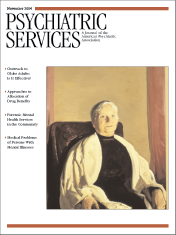Treatment of Tobacco Use in an Inpatient Psychiatric Setting
Abstract
OBJECTIVE: Despite high rates of tobacco use among psychiatric patients, such patients are one of the least studied groups of smokers, and little is known about their access to cessation treatment. This study examined delivery of tobacco cessation services in a smoke-free inpatient psychiatric setting. METHODS: Medical records of 250 psychiatric inpatients who were admitted from 1998 to 2001 were randomly selected and systematically reviewed. RESULTS: A total of 105 patients (42 percent) were identified as current smokers; the mean±SD number of cigarettes that they smoked per day was 21±15. Smokers evidenced statistically greater agitation and irritability compared with nonsmokers. None of the smokers received a diagnosis of nicotine dependence or withdrawal, and smoking status was not included in treatment planning for any patient. Nicotine replacement therapy was prescribed for 59 smokers (56 percent); of these patients, 54 (92 percent) used it. Smokers who were not given a prescription for nicotine replacement therapy were more than twice as likely as nonsmokers and smokers who were given a prescription for this therapy to be discharged from the hospital against medical advice. Only one smoker was encouraged to quit smoking, referred for cessation treatment, or provided with nicotine replacement therapy on discharge. CONCLUSIONS: Psychiatric inpatients smoke at high rates, yet interventions to treat this deadly addiction are rare. Furthermore, nicotine withdrawal left unaddressed may compromise psychiatric care.



